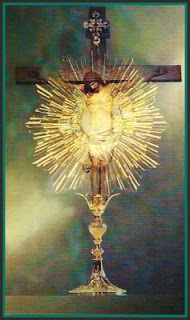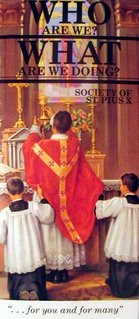Jan van Eyck’s painting “Ghent Altarpiece ,” finished in 1432, depicts Christ the King.
,” finished in 1432, depicts Christ the King.
Each year, the Church celebrates the Solemnity of Christ the King and gloriously acknowledges the Kingship of Jesus Christ. According to the Traditional Calendar, the Feast of the Kingship of our Lord Jesus Christ falls on the last Sunday of October. The primary theme surrounding our lesson for this week is a need to allow our Blessed Lord to be the ruler of our lives. To Jesus alone is the sovereignty of all realms of life. He must reign in our hearts, in our homes, and in our society.
For Jesus Christ is not just King of the saints or of Catholics. Jesus Christ is King of all Creation from eternity to eternity. For not only did He create all that exists, He also redeemed all mankind to restore creation to a greater glory. He deserves all glory, honor, and praise. Jesus Christ is the King of the Universe, the King of all creation, of all things seen and unseen.
Information for the Feast of Christ the King:
The Feast of Christ the King was established by Pope Pius XI in 1925 as an antidote to secularism, a way of life which leaves God out of man's thinking and living and organizes his life as if God did not exist. The feast is intended to proclaim in a striking and effective manner Christ's royalty over individuals, families, society, governments, and nations.
Today's Mass establishes the titles for Christ's royalty over men: 1) Christ is God, the Creator of the universe and hence wields a supreme power over all things; "All things were created by Him"; 2) Christ is our Redeemer, He purchased us by His precious Blood, and made us His property and possession; 3) Christ is Head of the Church, "holding in all things the primacy"; 4) God bestowed upon Christ the nations of the world as his special possession and dominion.
Today's Mass also describes the qualities of Christ's kingdom. This kingdom is: 1) supreme, extending not only to all peoples but also to their princes and kings; 2) universal, extending to all nations and to all places; 3) eternal, for "The Lord shall sit a King forever"; 4) spiritual, Christ's "kingdom is not of this world".
The Feast of Christ the King was established by Pope Pius XI in 1925 as an antidote to secularism, a way of life which leaves God out of man's thinking and living and organizes his life as if God did not exist. The feast is intended to proclaim in a striking and effective manner Christ's royalty over individuals, families, society, governments, and nations.
Today's Mass establishes the titles for Christ's royalty over men: 1) Christ is God, the Creator of the universe and hence wields a supreme power over all things; "All things were created by Him"; 2) Christ is our Redeemer, He purchased us by His precious Blood, and made us His property and possession; 3) Christ is Head of the Church, "holding in all things the primacy"; 4) God bestowed upon Christ the nations of the world as his special possession and dominion.
Today's Mass also describes the qualities of Christ's kingdom. This kingdom is: 1) supreme, extending not only to all peoples but also to their princes and kings; 2) universal, extending to all nations and to all places; 3) eternal, for "The Lord shall sit a King forever"; 4) spiritual, Christ's "kingdom is not of this world".
Source: Rt. Rev. Msgr. Rudolph G. Bandas
Quas Primas:
"In the first Encyclical Letter which We addressed at the beginning of Our Pontificate to the Bishops of the universal Church, We referred to the chief causes of the difficulties under which mankind was laboring. And We remember saying that these manifold evils in the world were due to the fact that the majority of men had thrust Jesus Christ and his holy law out of their lives; that these had no place either in private affairs or in politics: and we said further, that as long as individuals and states refused to submit to the rule of our Savior, there would be no really hopeful prospect of a lasting peace among nations. Men must look for the peace of Christ in the Kingdom of Christ; and that We promised to do as far as lay in Our power. In the Kingdom of Christ, that is, it seemed to Us that peace could not be more effectually restored nor fixed upon a firmer basis than through the restoration of the Empire of Our Lord. We were led in the meantime to indulge the hope of a brighter future at the sight of a more widespread and keener interest evinced in Christ and his Church, the one Source of Salvation, a sign that men who had formerly spurned the rule of our Redeemer and had exiled themselves from his kingdom were preparing, and even hastening, to return to the duty of obedience."
ENCYCLICAL OF POPE PIUS Xl DECEMBER 11, 1925
"In the first Encyclical Letter which We addressed at the beginning of Our Pontificate to the Bishops of the universal Church, We referred to the chief causes of the difficulties under which mankind was laboring. And We remember saying that these manifold evils in the world were due to the fact that the majority of men had thrust Jesus Christ and his holy law out of their lives; that these had no place either in private affairs or in politics: and we said further, that as long as individuals and states refused to submit to the rule of our Savior, there would be no really hopeful prospect of a lasting peace among nations. Men must look for the peace of Christ in the Kingdom of Christ; and that We promised to do as far as lay in Our power. In the Kingdom of Christ, that is, it seemed to Us that peace could not be more effectually restored nor fixed upon a firmer basis than through the restoration of the Empire of Our Lord. We were led in the meantime to indulge the hope of a brighter future at the sight of a more widespread and keener interest evinced in Christ and his Church, the one Source of Salvation, a sign that men who had formerly spurned the rule of our Redeemer and had exiled themselves from his kingdom were preparing, and even hastening, to return to the duty of obedience."
ENCYCLICAL OF POPE PIUS Xl DECEMBER 11, 1925
Why Do We Celebrate the Feast of Christ the King on the Last Sunday of October? Pope Pius XI explains:
"Therefore by Our Apostolic Authority, We institute the Feast of the Kingship of Our Lord Jesus Christ to be observed yearly throughout the whole world on the last Sunday of the month of October - the Sunday, that is, which immediately precedes the Feast of All Saints. We further ordain that the dedication of mankind to the Sacred Heart of Jesus, which Our predecessor of saintly memory, Pope Pius X, commanded to be renewed yearly, be made annually on that day" (Quas Primas)
Indulgence for Feast of Christ the King:
A partial indulgence is granted to the faithful, who piously recite the Act of Dedication of the Human Race to Jesus Christ King. A plenary indulgence is granted, if it is recited publicly on the feast of our Lord Jesus Christ King.
Prayers to Christ the King:
O Jesus Christ, I acknowledge Thee as universal King. All that has been made, has been created for Thee. Exercise all Thy rights over me. I renew my baptismal vows, renouncing Satan, his pomps and his works; and I promise to live as a good Christian. In particular do I plege myself to labor, to the best of my ability, for the triumph of the rights of God and Thy Church.
Divine Heart of Jesus, to Thee do I proffer my poor services, laboring that all hearts may acknowledge Thy Sacred Kingship, and that thus the reign of Thy peace be established throughout the whole universe. Amen.
Prayer Source: My Catholic Faith: A Manual of Religion by Most Rev. Louis Laravoire Morrow, S.T.D., My Mission House, 1965



.jpg)












